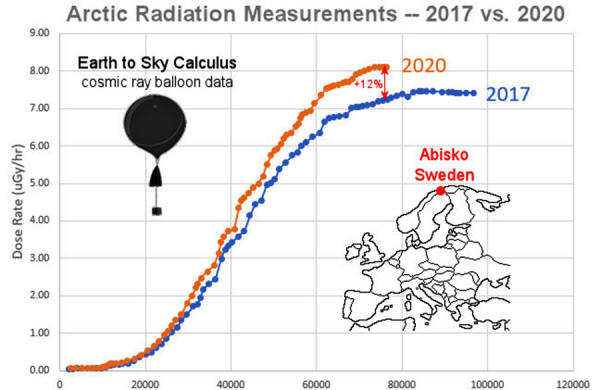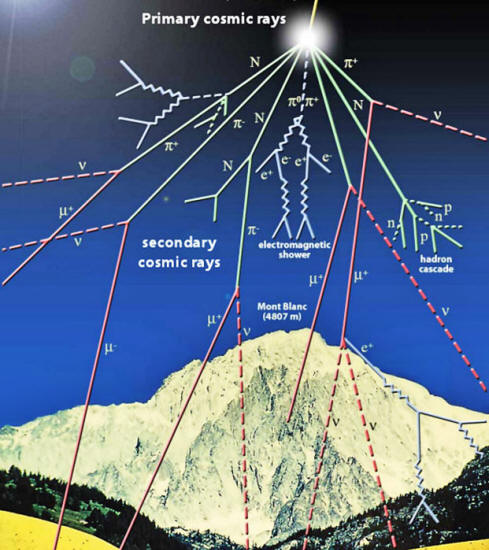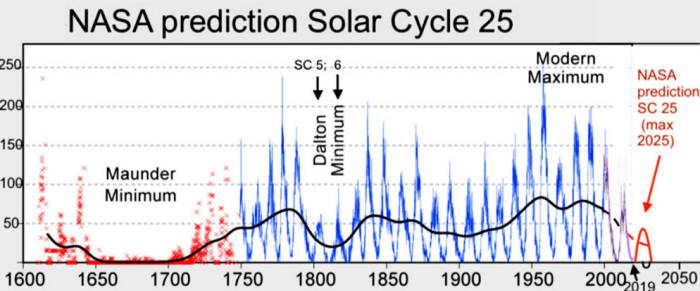|
by Cap Allon
In January 2020, the students of Earth to Sky Calculus, in partnership with the ever-excellent spaceweather.com, traveled to Abisko, Sweden to launch a pair of cosmic ray balloons.
The team are now back, and have some new results to share…
The above top graph shows radiation dose rate (uGy/hr) vs. altitude (feet) all the way from ground level to the stratosphere, writes Dr Tony Phillips.
Radiation appears to be increasing at nearly all altitudes - even in the range 25,000 ft to 40,000 ft where airplanes fly - polar flight crews and passengers are therefore absorbing ~12% more cosmic radiation than they did only a few years ago.
So, what's causing the increase?
At the moment, the sun is near the bottom of the 11-year solar cycle.
During Solar Minimum, the sun's magnetic field weakens, allowing extra cosmic rays from deep space to penetrate the solar system. These cosmic rays are hitting Earth's atmosphere, creating a spray of secondary cosmic rays that shower toward the ground below - secondary cosmic rays are what we measure.
Radiation sensors onboard our helium balloons detect X-rays and gamma-rays in the energy range 10 keV to 20 MeV, similar to what you get from medical X-ray machines and airport security scanners.
Schematic diagram of a cosmic ray air shower. Learn more from CERN.
We've been launching radiation sensors almost weekly for 5 years - mainly from California, the "home base" of spaceweather.com.
Cosmic rays in the stratosphere have been increasing the entire time, a sign of deepening Solar Minimum...
The new data from Abisko, Sweden show the increase is not limited to the stratosphere - it is also happening at aviation altitudes with a 3-year increase of ~12% even below 40,000 ft. (12,200 meters).
The
Earth to Sky
Calculus and
spaceweather.com
team are planning another ballooning trip to Sweden in August 2020
to confirm these results - stay tuned for updates, urges Dr
Phillips.
Implications of Increasing Cosmic Rays
Far more crucially than flight crews and passengers receiving higher doses of radiation, Cosmic Rays hitting Earth's atmosphere seed clouds (Svensmark et al), and cloud cover plays perhaps the most crucial role in our planet's short-term climate change.
The upshot of this current solar minimum 24 - the sun's deepest of the past 100+ years (NASA) - is a cooling of the planet, and with the coming solar cycle 25 forecast by NASA to be "the weakest of the past 200 years" the skies are only forecast to darken further, and the cooling intensify:
Solar cycle 25 is expected to be a mere stop-off in the suns descent into its next full-blown GRAND solar minimum cycle (GSM):
GSMs (like the Maunder Minimum) have linked to prolonged periods of global cooling by NASA here.
And there's a double-whammy…
MAGNETIC POLE SHIFT
Earth's ever-accelerating Pole Shift/Magnetic Excursion is further amplifying the Cosmic Ray situation.
We have two lines of defense against CRs:
Earth's magnetosphere is waning at an increasing rate as north and south magnetic poles continue their wander, with some predictions putting a meeting point over Indonesia within the next few years.
Previous magnetic excursions and reversals have led to,
Contrary to popular belief, ice age conditions can begin incredibly quickly:
These two independent factors occurring simultaneously - Grand Solar Minimum and Pole Shift - are throwing us something of a curve-ball.
Each factor results
in a dramatic waning of earth's magnetosphere, the upshot of which
is more Cosmic Rays entering our atmosphere
nucleating clouds,
sending
volcanoes a 'poppin',
and mutating biology across the
planet. Modern civilization is entering unprecedented times...
|





